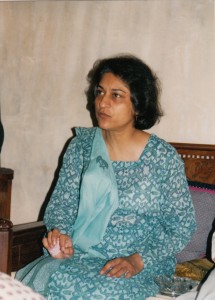Shortly before August 29, 1998, when I interviewed Asma Jahangir

in Lahore, a Constitutional Amendment was introduced in Pakistan’s Parliament, the Majlis-e-Shoora, proposing the establishment of sharia’a law in Pakistan. Over several days, there were protests by lawyers and other related groups. I asked Asma Jahangir what she thought of the proposed amendment.
Asma Jahangir: “If consitutional amendments are to be carried out, according to this amendment, it will be by a simple majority – in other words, twenty-seven members of the National Assembly could actually carry out a consitutional amendment. This is a mockery of law-making. So you could get up in the morning and hear that a constitutional amendment has been carried out that has an impact on me as a citizen, as a woman, as a lawyer.”
AG: “What will it mean for women?”
Asma Jahangir: “It will mean that our lives will be in the hands of the federal government, which does not make me very happy.”
AG: “One of the things that intrigues me about this amendment is what sort of Islamic legal system is going to be put into place? Is it to be Maliki law or Hanafi law…?”
Asma Jahangir: “Absolutely. It says that every sect can interpret it for themselves, which really means also planting sectarianism. How are they going to do it? If I am a Maliki and I’m married to someone who is Shafi’I? Then what personal law will apply? Mine or his? Or if I have a contract? If I’m a Sunni and I have a contract with a Shi’a? It’ll be pure confusion – it’ll be a free-for-all; it’ll create havoc for the legal system.”
AG:“From what you’re saying, it sounds as though the legal system will collapse.”
Asma Jahangir:“It will collapse. The legal system will collapse, the judiciary will collapse. [We will be left] to the dictates of a handful of people.”
AG:“Would you say that what has happened in Pakistan is the result of having a very small ruling class?”
Asma Jahangir: “Countries which have a ruling elite that is devoid of all values, which gives leadership only to the agenda that everybody is for themselves – that is the disaster of Pakistan. If you look at the ruling classes of Pakistan and compare them to the ruling classes of India, Sri Lanka, Bangladesh and Nepal, you will find very few people who are actually worried, who are actually taking an interest, who actually interact with the people of this country. They live like foreigners here. And that is I think the unfortunate part. Most of the ruling classes of Pakistan have always sided with the establishment. The few exceptions are freaks really. Even Mr Bhutto was from the establishment. Benazir is the first removed in one way. If you look at it that way, it’s pathetic.”
AG: “What could be the future of the Mohajir movement?”
Asma Jahangir: “Let me say this – and there have been reports of the Human Rights Commission saying the same thing – every ethnic group has the right to make demands. You may disagree with them and say that they want more than their fair share. But disagreement has to be intellectual and it has to be through dialogue. The fact that we resist a movement to start with and begin with the lowest kind of attack on their integrity, tends to harden the situation. I or you may believe that this movement was put up; we may believe that this was a terrorist movement, but the responsibility of the government is to engage in dialogue, not to start dubbing them one thing or another. In every movement there are all kinds of people, and you want to bring a dialogue forward in order to encourage those people who want a peaceful settlement. I think there has not been enough reaching out. You can’t kill a movement through state terrorism, if I may use that word, because then you’re really strengthening the movement.”
